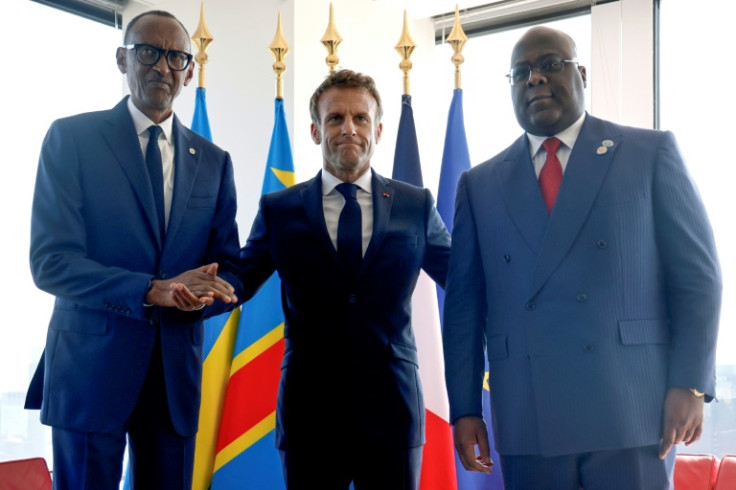Macron Lauds DR Congo Ceasefire As EU Sets Up Air Bridge

Brussels said Saturday it was setting up a "humanitarian air bridge" to deliver aid to conflict-hit eastern Democratic Republic of Congo, as the visiting French president said all sides had given support to a ceasefire next week.
The air bridge will link with Goma, the capital of DR Congo's eastern North Kivu province, where fighting with the rebel group M23 has displaced more than 600,000 people.
The operation will "deliver humanitarian support in the form of medical and nutritional supplies along with a range of other emergency items", a European Commission statement said.
Meanwhile French President Emmanuel Macron, visiting the country on the last leg of his African tour aimed at renewing frayed ties, said that all sides would support a ceasefire in the fighting.
During talks with Angolan President Joao Lourenco and DRC President Felix Tshisekedi, as well as Rwandan President Paul Kagame, Macron said all had "given clear support" to a ceasefire next Tuesday, as envisaged in the timeline mediated by Angola.
Despite Congolese pressure to do so, Macron avoided overt public criticism of alleged Rwandan support for M23, which Tshisekedi called "unjust and barbarous aggression."
DR Congo "must not comprise the spoils of war. Open looting (of the country) must cease. There must be no pillaging, no balkanisation, no war," Macron insisted at a joint press conference with Tshisekedi.
The EU said it was also releasing some 47 million euros to be channelled through humanitarian partners for immediate needs such as nutrition, healthcare, shelter and water.
"The EU stands ready to mobilise all the necessary means to support humanitarian workers, including logistics and air, to meet the needs of the population in Democratic Republic of Congo," said the EU's commissioner for crisis management Janez Lenarcic.
The DRC government has accused Rwanda of backing the militia group M23, which re-emerged from dormancy in late 2021, subsequently occupying swathes of territory in North Kivu.
Independent UN experts, the United States and other western countries -- including France -- agree with Kinshasa's assessment, but Rwanda denies the charge.
Addressing the issue, Macron, rather than announce sanctions, called on all parties to "take responsibility" for the situation in the region, "Rwanda included."
He went on: "What we expect of Rwanda and others is to engage and respect appointments which they give themselves under the supervision of mediators -- and , if they do not respect, then, yes, there can be sanctions. I say this very clearly."
Anti-French sentiment runs high in some former African colonies as the continent becomes a renewed diplomatic battleground, with Russian and Chinese influence growing.
On Thursday Macron said the era of French interference in Africa had ended and there was no desire to return to the past.
The French President met on Friday with President Denis Sassou-Nguesso of the neighbouring Republic of Congo, after visiting Angola and Gabon.
In the Angolan capital Luanda, Macron held talks with his counterpart Joao Lourenco, calling the oil-rich country a "strategic partner in the region".
Macron, who chaired an economic forum attended by more than 50 French companies, said the "heart of this visit is the strengthening of agricultural partnerships" with Angola.
France has for decades been involved in the petroleum industry in the Portuguese-speaking southern African country, which is one of the continent's top crude producers.
Before leaving Luanda, the French president thanked Lourenco for his work to restore stability to the region, highlighting his diplomatic efforts in conflict-torn eastern DRC.
He added that there are "legitimate hopes" for a de-escalation in the turbulent region.
Macron also met with Central African Republic President Faustin-Archange Touadera in Gabon on Thursday, after relations had deteriorated as Russian influence increased in Bangui and French troops left the troubled country last year.
© Copyright AFP 2025. All rights reserved.




















